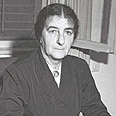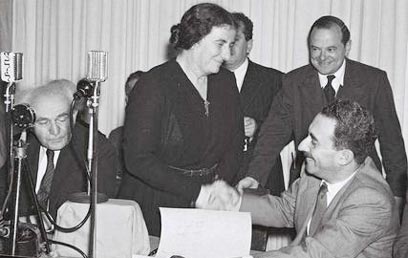
Golda Meir (1898-1978) served as Israel's third prime minister (1969-1974) and the first, and so far only, woman to be premier of Israel to date. She was elected prime minister by the Mapai Party after the death of then-Prime Minister Levi Eshkol in early 1969. She stepped down in 1974, following the Yom Kippur War.
Golda Mabovitch was born in Kiev in 1898. In 1906 her family immigrated to the United States in hopes of finding better economic prospects. They settled in Milwaukee, Wisconsin and later moved to Denver, Colorado. While in high school, she joined the Workers of Zion movement and in 1921 she immigrated to Palestine with her husband, Morris Myerson. They settled in Kibbutz Merhavya and shortened their name to Meir.
In 1924 the couple moved to Tel Aviv and Meir became an official in the Histadrut Labor Federation. In 1928 she was named secretary of the Halutz women workers council, and between 1932 and 1934 she worked the group's emissary in the US. Upon her return he was named head of the council's political division.
Steps in national politics
In 1946, after the British authorities imprisoned most of the Jewish community's leadership, Meir took over as head of the Jewish Agency's Political Department and became active in raising funds in the US to fund the nearing War of Independence.

Instrumental in creating Labor (Archive photo: GPO)
In 1948, Israel's first Prime Minister, David Ben-Gurion, made Meir a member of the provisional government. In June of 1948, Meir was made ambassador to the Soviet Union. In 1949 he was elected to the Knesset as a member of Mapai and served as Minister of Labor until 1956.
In June of that year she was named Foreign Minister, a position she held until 1966. After leaving the government, she became Mapai's party secretary. After the Six Day War, she was instrumental in facilitating the divided Mapai's reincarnation into the new political power in the Left – HaMa'arach (The Alignment) which evolved into Labor.
When Prime Minister Levi Eshkol died in early 1969, Meir was voted premier by here party, becoming the first woman in Israeli history to hold the post – and the only one to date. Meir's habit to hold unofficial meetings with her cabinet members in her home kitchen – a custom harshly criticized by her opponents – later coined the phrase "security kitchenette," for the crucial security decision which often made there.
The Yom Kippur War and political aftermath
In 1973, Golda Meir was elected prime minister for the second time. Her short tenure in office is mostly remembered by the Yom Kippur War, when Israel was surprised by a joint attack devised by Egypt, Syria and other Arab nations, on October 6, 1973.
The Agranat National Commission of Inquiry appointed to probe the circumstances leading to the failure in Israeli intelligence and readiness found both the IDF and government had seriously erred in assessing Arab moves prior to the war, but cleared Meir of any direct responsibility. Nevertheless, Golda Meir stepped down in April 1974. She was replaced by Yitzhak Rabin.
Golda Meir succumbed to cancer on December 8, 1978. She was buried in Mount Herzl.














